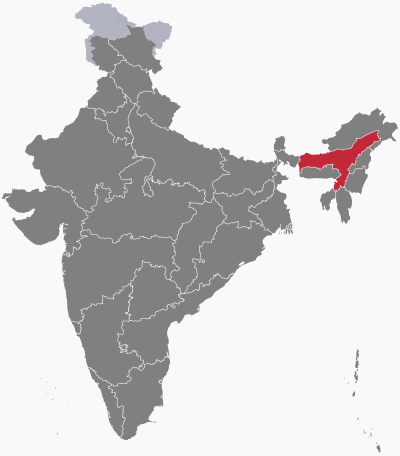
Search
Assam separatist movements

Assam separatist movements refers to a series of multiple insurgent and separatist movements that had been operated in the Northeast Indian state of Assam. The conflict started in the 1970s following tension between the native indigenous Assamese people and the Indian government over alleged neglect, political, social, cultural, economic issues and increased levels of illegal immigration from Bangladesh. The conflict has resulted in the deaths of 12,000 United Liberation Front of Assam (ULFA) militants and 18,000 others.
Several organisations contribute to the insurgency including the ULFA, the Adivasi National Liberation Army, Karbi Longri N.C. Hills Liberation Front (KLNLF) and the National Democratic Front of Bodoland (NDFB) with ULFA perhaps the largest of these groups, and one of the oldest, having been founded in 1979. The ULFA has attacked Hindi-speaking migrant workers and a movement exists favouring secession from the Republic of India. The alleged neglect and economic, social, cultural and political exploitation by the Indian state are the main reasons behind the growth of this secessionist movement.
The ULFA seeks to establish a sovereign Assam via armed struggle. MULTA (Muslim United Liberation Tigers of Assam), on the other hand, seeks to establish an Islamic state in India via the jihadist struggle of Muslims of both indigenous and migrant origin. The Government of India banned the ULFA in 1990 and classifies it as a terrorist group, while the US State Department lists it under "other groups of concern".
Founded at Rang Ghar, a historic structure dating to the Ahom kingdom on April 7, 1979, the ULFA has been the subject of military operations by the Indian Army since 1990, which have continued into the present. In the past two decades some 30,000 people have died in the clash between the rebels and the government. Though separatist sentiment is considered strong, it is disputed if the secessionist movement continues to enjoy popular support. Conversely, assertions of Assamese nationalism are found in Assamese literature and culture. The neglect and exploitation by the Indian state are common refrains in the Assamese-language media with some reports casting the ULFA leaders as saviors.
Internationally acclaimed Assamese novelist Indira Goswami has tried to broker peace for several years between the rebels and the government. In a recent development Hiren Gohain, a public intellectual, has stepped in to expedite the process.
Notable incidents
In June 7 in 2007, Dilip Agarwal, an Indian businessman (grocer) and his son, Rajat Agarwal were kidnapped by four suspected Adivasi National Liberation Army (ANLA). In December of the same year, an improvised explosive device planted in a train compartment on its way from Dibrugarh to Delhi, India, blast killing 5 civilians and wounded five more. The ANLA claimed the attack to the media asking for more rights and recognition for the community in the state.
In December 23, 2008, armed militants of the ANLA shot dead the Deputy Manager Gautom Kotoky a senior tea executive in Carramore tea estate (owned by McLeod & Russell Group) along the India-Bhutan border under Harisinga Police Station in Odalguri, Assam. In the next day, a bomb blasts on railway tracks between Khatkhati and Bokajan. The attack left only material damage, and were attributed to the ANLA.
In July 10 of 2011, an explosion was registered in the Guwahati-Puri Express train. Four of the train's coaches were derailed and over 100 people were wounded, and the attack caused an unknown amount of property damage to the tracks and train. Authorities said the bomb was placed on the track with wires and other trigger materials, which were found after the bombing. The Adivasi People's Army (APA) claimed responsibility for the attack through an email, and the police suspected that National Democratic Front of Bodoland for the bombing. Suspected APA militants attacked and wound Zakir Hussain, leader in the Assam Minorities Students' Union (AMSU); he held the position of Kamandanga unit assistant secretary. The attack took place in Kokrajhar district, Assam. The APA carried out other similar attacks in train tracks.
In December 21, the businessman Ratan Saha was kidnapped by members of the Adivasi Cobra Militants of Assam (ACMA) in Kokrajhar, Assam. In response, locals violently protested the kidnapping and demanded that Saha be released in one day. There were no reports of the outcome of the kidnapping.
During 2012, all Adivasi militants including those of Adivasi Cobra Force surrendered. In December of the same year, armed militants of the ANLA kidnapped Gobin Goswami, the headmaster of Kuwoni Lower Primary School in Golaghat, the motive of the abduction and the outcome of the kidnapping is unknown.
Suspect members of the ANLA abducted a grocery store owner and his employee in Majuli area, Sonitpur. The attackers claimed the kidnapping because they had failed to make ransom payments.
On 15 May 2019, twelve people were injured after a grenade exploded in front of a shopping mall in Guwahati. Days later the United Liberation Front of Assam claimed responsibility for the attack, and the authorities arrested the main suspects.
In 2020 and 2021, all Bodo, Karbi, Kuki and Dimasa militants surrendered to the government of India.
In 2022, Gorkha and Tiwa Militants also surrendered.
See also
- Operation All Clear
- 2008 Assam bombings
- Bhimajuli Massacre
- 2009 Guwahati bombings
- 2009 Assam serial blasts
- Insurgency in North-East India
- Separatist movements of India
References
Text submitted to CC-BY-SA license. Source: Assam separatist movements by Wikipedia (Historical)
Owlapps.net - since 2012 - Les chouettes applications du hibou
